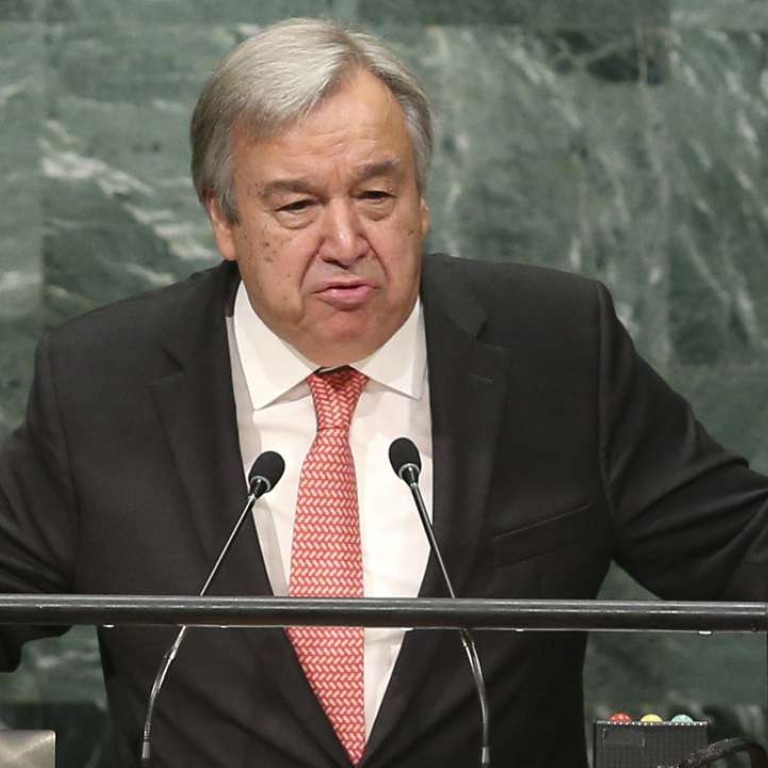
Antonio Guterres ‘appeals for peace’ but new UN chief faces uphill battle to win over Trump administration
US president-elect Trump has shown little interest in multilateralism, which Guterres says is “the cornerstone” of the UN
The new United Nations chief Antonio Guterres said on Sunday he would like to make 2017 a year to “put peace first,” in a message heralding the new year and marking his first day as the world body’s chief.
The former Portuguese prime minister, 67, took over as UN secretary general from South Korea’s Ban Ki-moon, inheriting complex crises in Syria, South Sudan, Yemen, Burundi, North Korea and elsewhere.
“How can we help the millions of people caught up in conflict, suffering massively in wars with no end in sight?” Guterres said. “Civilians are pounded with deadly force. Women, children and men are killed and injured, forced from their homes, dispossessed and destitute. No one wins these wars; everyone loses.”
How can we help the millions of people caught up in conflict, suffering massively in wars with no end in sight?
Ushering in 2017, Guterres asked the world to make “one shared New Year’s resolution: Let us resolve to put peace first.
“Let us make 2017 a year in which we all – citizens, governments, leaders – strive to overcome our differences.”
The unanimous election of Guterres – who fought for migrants’ rights as the UN High Commissioner for Refugees for a decade – has energised UN diplomats who see him as a skilled politician who may be able to overcome the divisions crippling the international organisation.
“Peace must be our goal and our guide,” he said. “All that we strive for as a human family – dignity and hope, progress and prosperity – depends on peace. But peace depends on us.”
Although Guterres has promised to be a “bridge-builder”, he may face an antagonistic incoming US administration led by Donald Trump, who thinks the world body’s 193 member states do nothing except talk and have a good time.
Guterres told reporters after being sworn in as secretary general on December 12 that he will engage all governments – “and, of course, also with the next government of the United States” – and show his willingness to cooperate on “the enormous challenges that we’ll be facing together”.
But Trump has shown little interest in multilateralism, which Guterres says is “the cornerstone” of the UN, and a great attachment to the Republicans’ “America First” agenda.
So as Guterres begins his five-year term, US support for the UN remains a question mark. And it matters because the US is a veto-wielding member of the UN Security Council and pays 22 per cent of the UN’s regular budget and 25 per cent of its peacekeeping budget.

Immediately after the US allowed the Security Council to condemn Israeli settlements in the West Bank on December 23 in a stunning rupture with past practice, Trump warned in a tweet: “As to the UN, things will be different after Jan. 20th,” the day he takes office.
Trump followed up three days later with another tweet questioning its effectiveness: “The United Nations has such great potential but right now it is just a club for people to get together, talk and have a good time. So sad!”
John Bolton, a conservative Republican and former US ambassador to the UN, said in an interview that Guterres would be well advised “especially given the incoming Trump administration” to follow the model of his predecessor, Ban Ki-moon, and do what member governments want.
If he tries to follow what Ban’s predecessor, Kofi Annan, did as secretary-general and try to be the world’s top diplomat and what some called “a secular pope”, Bolton said: “I think especially in the Trump administration, he would run into big trouble very quickly.”
Guterres has said he will also strive to deal with the inequalities that globalisation and technological progress have helped deepen, creating joblessness and despair especially among youth.
“Today’s paradox is that despite greater connectivity, societies are becoming more fragmented. More and more people live within their own bubbles, unable to appreciate their links with the whole human family,” he said.
“Our duty to the peoples we serve is to work together to move from fear of each other, to trust in each other, trust in the values that bind us, and trust in the institutions that serve and protect us. My contribution to the United Nations will be aimed at inspiring that trust.”

Guterres won the UN’s top job after receiving high marks from almost every diplomat for his performance in the first ever question-and-answer sessions in the General Assembly for the 13 candidates vying to replace Ban.
In an interview during his campaign, Guterres said the role of secretary general should be “an honest broker, a consensus builder” who engages as much as possible, in many circumstances discreetly.
“It’s not just to have a personal agenda, because it would be regrettable or ineffective, or to appear in the limelight,” he said.
“No. On the contrary, it’s to act with humility to try to create the conditions for member states that are the crucial actors in any process to be able to come together and to overcome their differences.”
Whether the Trump administration will join Guterres and UN efforts to tackle what he sees as “a multiplication of new conflicts” and the myriad problems on the global agenda remains to be seen.
Trump’s choice as US ambassador to the UN, Nikki Haley, who is the governor of South Carolina, has a reputation as a conciliator, which could be very useful especially in dealing with the Security Council and the four other permanent veto-wielding members – Russia, China, Britain and France, all of whom have their own national agendas. But she will be taking instructions from the president.

